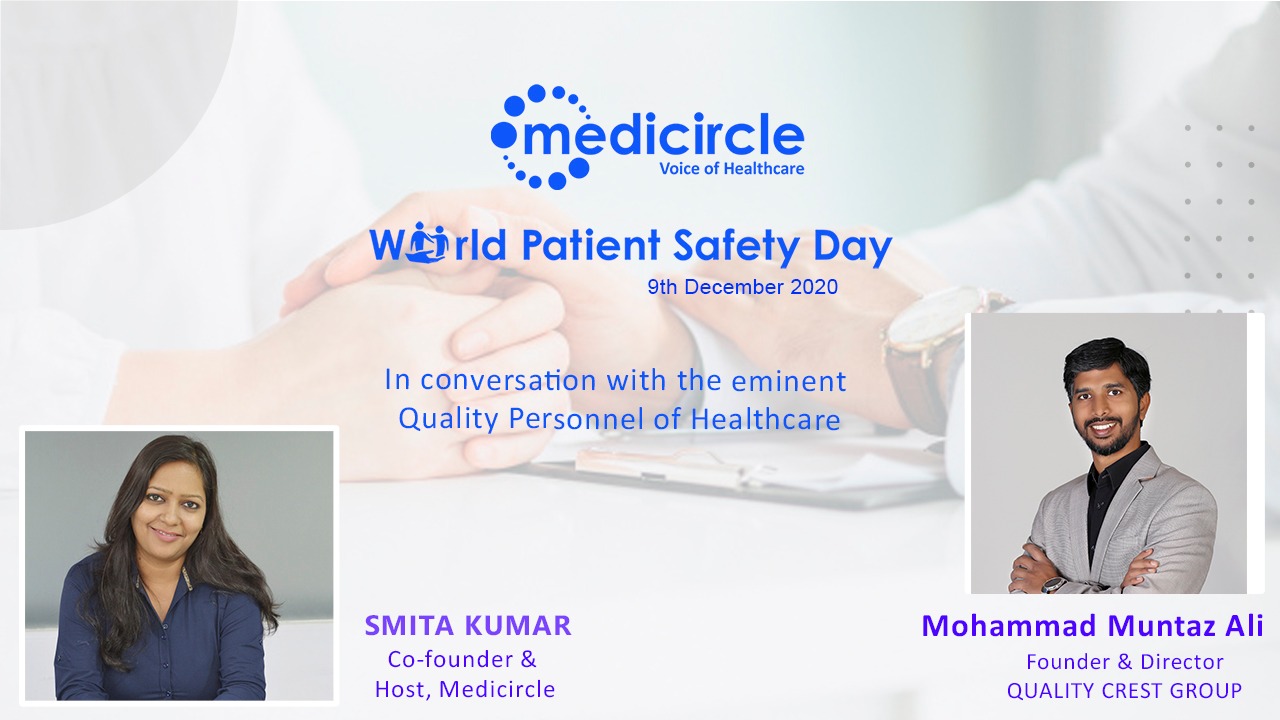Patient safety is the absence of preventable harm to a patient during the process of health care and the reduction of the risk of unnecessary harm associated with health care to an acceptable minimum.
Mohammad Muntaz Ali, Founder, and Director, Quality crest group primarily focuses on minimizing the Delays, Deviation, and Defects relevant to the hospital services and in turn align enhanced operational strategy to operations for improved services to the customers and patients.
Quality crest group work with a mission to provide effective, competitive, result in oriented & practical business solutions to the organizations to optimize their operational efficiency in order to maximize return on investment & ultimately to achieve goals in speciï¬ed timelines.
Challenges and risks health workers are facing
Mohammad shares his thoughts, “The COVID-19 pandemic has unveiled the huge challenges and risks health workers are facing globally including healthcare-associated infections, violence, stigma, psychological and emotional disturbances, illness, and even death. Furthermore, working in stressful environments makes health workers more prone to errors which can lead to patient harm. Globally, as many as 4 in 10 patients are harmed in primary and outpatient health care. Up to 80% of harm is preventable. The most detrimental errors are related to diagnosis, prescription, and the use of medicines. The occurrence of adverse events due to unsafe care is likely one of the 10 leading causes of death and disability in the world. Training of Healthcare workers on patient safety goals, Infection control practices implementing evidence-based medicine practices and adopting healthcare technologies is needed,” he says.
Strategies to improve the safety of health workers and patients
Mohammad explains, “As a consultant for healthcare Quality, Planning and designing I have been associated with more than 200 hospitals across south India with a team of 50 plus quality consultants I raised awareness about the importance of health worker safety and its interlinkages with patient safety by engaging with these hospitals in Telangana, Andhra Pradesh and Maharashtra with multiple stakeholders and adopted multimodal strategies to improve the safety of health workers and patients. Trained healthcare workers on coronavirus and chronic diseases, tips for patients with Hypertension, Diabetes, or NCD’s, Do’s and Don’ts for COVID, Infection Control practices for hospitals and conducting quality and patient safety audits,” he says.
The future of healthcare is with technology
Mohammad shares his opinion, “I strongly believe that the future of healthcare lies in working hand-in-hand with the technology, and healthcare workers have to embrace emerging healthcare technologies in order to stay relevant in the coming years. The areas where digital technology has made an enormous impact in healthcare include Improved Access to Medical Information and Data, Big Data for epidemiological studies, Electronic Health Records, Telemedicine/Telehealth, analytics applications to measure clinical, financial, and operational improvements, and Online Health Education. A lower rate of medication errors is possible through patient record analysis; software can flag any inconsistencies between a patient’s health and drug prescriptions, alerting health professionals and patients when there is a potential risk of a medication error. Facilitating Preventive Care – a high volume of people stepping into emergency rooms are recurring patients also called "frequent flyers.” Telehealth/ Telemedicine reduced the travel time and money of the peripheral/ rural patients to super-specialty hospitals and doctors in Metros for follow-up consultations,” he says.
Work as a team towards quality improvement
Mohammad explains in brief, “Ensuring patient safety is a vital part of medical care and a key component of a quality healthcare experience. As a healthcare Quality consultant me the key points are evidence-based principles for hospital design to improve patient safety and quality of healthcare. Training hospital staff to communicate effectively at different levels and work as a team towards quality improvement. Strong patient engagement in decision making and education can supplement patient safety initiatives in the hospital and the use of Healthcare Information Technology and AI (artificial intelligence) for data capture, analysis, and implementation can bring down medication errors, reduce readmissions, wrong-site surgeries, adverse events and enhance patient safety,” he says.
Edited By- Rabia Mistry Mulla

 “Globally, as many as 4 in 10 patients are harmed in primary and outpatient health care. Up to 80% of harm is preventable,†says Mohammad Muntaz Ali, Founder, and Director, Quality crest group
“Globally, as many as 4 in 10 patients are harmed in primary and outpatient health care. Up to 80% of harm is preventable,†says Mohammad Muntaz Ali, Founder, and Director, Quality crest group









.jpeg)




.jpeg)

.jpg)













